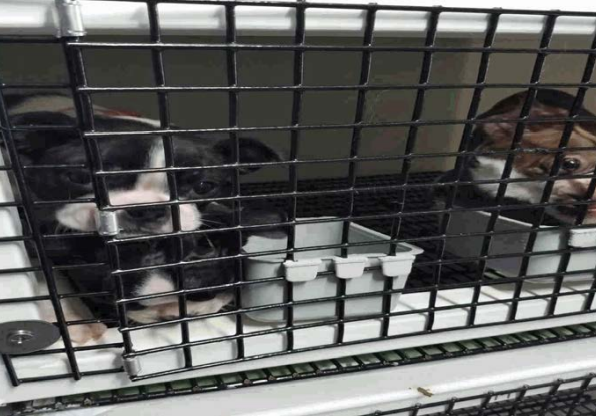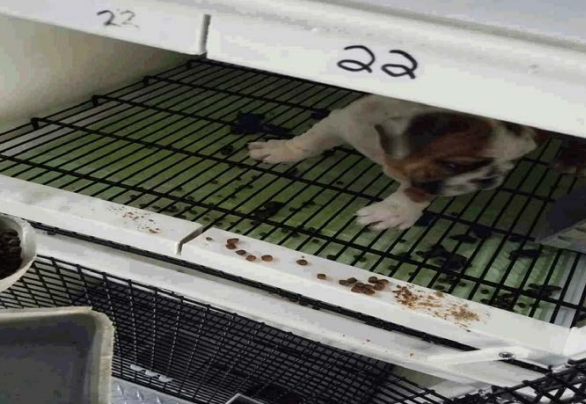The Lowcountry Responds to Petland Summerville Selling Sick Puppies

Written by Hali Selert, Staff Writer
Petland Summerville has made headlines recently for selling sick puppies. Unfortunately, this is nothing new for the Petland chain, which has been involved in numerous lawsuits across the country. There was an immediate sense of outrage following the spur of Facebook posts that went viral in the Lowcountry about the sick and dying puppies, but now that we are a few weeks out from the initial posts, things have seemed to calm down. What do we do now? Do we wait for more stories to the surface of sick puppies, or do we demand change?
Photo from Petland provided by HSUS
Petland Summerville became the first and only store in Charleston to sell puppies from breeders when it changed ownership in the summer of 2018. Lowcountry Dog Magazine spoke with the owner, Brad Parker, shortly after the store re-opened. In August of 2018, Parker could not provide a name of a veterinarian or veterinary clinic that he would be using for the puppies in South Carolina, but could boast that during the opening weekend, the store “was busier than it probably ever had been in the history of being open.” In this conversation, he did mention that he was surprised that local shelters didn’t touch on Petland Summerville “selling sick dogs” during a press conference that was held in opposition to the store. Was this a Freudian slip, foreshadowing the headlines to come a year and a half later?
In the same August 2018 interview, Parker indicated that Petland “monitors” their puppies for the first 48 hours they are in their care. Sounds responsible, right? Not necessarily. A puppy that is sick with Parvo can take 3-10 days to show symptoms of the disease. That puppy can be shipped to the store in a truck filled with other puppies, sit in their care for two days, and then go off to its home, infecting countless other dogs and puppies before it ever shows a symptom of the life-threatening disease it is infected with. Even worse, a puppy with Distemper usually takes 1-2 weeks, and sometimes 3-5 weeks, to show symptoms of the disease.
The recent media coverage started in December after multiple Facebook posts detailing horrific situations with Petland Puppies went viral. Megan Madden’s Facebook post said that her Wheaten Terrier, Chewie, was diagnosed with Canine Influenza, Parvovirus, Bordetella, and Distemper three weeks after taking him home. Luckily for Megan and her family, Chewie is recovering.
Kody purchased from Petland Summerville passed before he was 4 mths old.
Nicole Curry and her family were not so lucky. They purchased a Newfoundland puppy from Petland Summerville, named Kody. Within a week of being with his family, Kody declined and was diagnosed with Adenovirus, Mycoplasma, Parainfluenza, Bordetella, and Distemper. Unfortunately, Kody passed away a day before he turned four months old.
The owners of the sick puppies said that when taking their dogs to the emergency vet clinics in the area, as soon as the clinic learned where the puppy came from, they changed their course of action. In her Facebook post, Curry indicated that she was told to skip the waiting room and take her puppy straight back to a room to avoid contaminating the pets in the lobby. To follow up on this, I called Charleston Veterinary Referral Center in West Ashley, and was told that if a puppy from Petland were to come in for vomiting, they would bring paperwork out to the car for the owner to fill out, and then take the puppy immediately to an isolation room to avoid cross-contamination.
English Bulldog Puppy at a Petland, photo courtesy of HSUS
Petland Summerville released a statement regarding the Distempter puppies, saying “The health and well-being of our pups is our number one priority unfortunately, puppies do sometimes get sick, just like babies. At our Summerville store, these instances are not common, but if a puppy becomes ill after purchase, we do have a warranty in place to protect both the pet and customer.”
The “warranty” allows for an owner to return their sick dog and get their purchase price and vet expenses refunded, keep the dog and be reimbursed for veterinary bills, or return the dog and get another one, plus have the vet bills refunded.
Also following the Distemper attention, Petland Summerville temporarily closed its business. The store was closed for several days in early December for “annual sterilization.” Many community members speculated that this meant the store was conducting a mass-euthanization of their puppies, which the chain has been accused of doing several times in the past. Upon reopening, the store indicated that all of the puppies that had been there prior to the sterilization had been “adopted.”
Protesters at Petland Summerville. Photo courtesy of SC communities against commercial breeding Facebook group.
If you want to get involved to help #shutdownPetland, join the “Shut Down Petland Summerville, SC” Facebook group. Members posting in the group to create discussion around ways to stop the practice of selling puppies, especially sick puppies and also organize protests through the group regularly.
Below is a video sent to Lowcountry Dog Magazine, by Brad Parker, owner of Petland Summerville.
“At Petland, we only use the best breeders when it comes to our puppies. Here is a highlight from our most recent breeder trip. As you can see our breeders go above and beyond any standard. They show endless love and compassion for all of their animals.”
We asked Meredith Blanchard, Public Policy Coordinator, Puppy Mills Campaign, for the Humane Society of the United States (HSUS) for more information on investigations into Petland breeders and the above video. The following is a statement from HSUS concerning Petland breeders:
“These are set-up, model kennels and certainly do not represent what most USDA licensed breeders look like. In fact, it’s common for one property to have a “model” building that the buyers see, while the majority of the dogs are kept in much more dismal conditions (stacked wire cages) in other barns on the property.” Many of these images of “Petland breeders” are being used by other puppy selling pet stores in similar videos.
Below are two photographs that Nebraska state inspectors took of a puppy mill that supplies Petland with puppies. The breeder’s name is Milton Lewis and he was in our Horrible Hundred report in 2018. We had a complaint just last year from a Petland buyer whose dog came from this operation. Petland paperwork claimed Lewis was a “hobby” breeder.
Milton Lewis NE 9.20.17 newfie with fly strike
Milton Lewis NE 9.20.17 golden retriever in a hole
The photos were taken by state inspectors. The first photo shows an injured golden retriever who was found hiding in a hole trying to get away from the other dogs who were attacking her. The second photo shows one of many dogs that Milton Lewis euthanized after authorities told him the dogs needed vet care for minor issues.
The state inspector offered to help Milton transfer the dogs to rescue groups if he didn’t want to pay for their medical treatment, but he refused, destroying a total of 14 dogs apparently just to spite the inspector. At the time, he was state-licensed, but now he is both USDA and state-licensed, with no current USDA violations.
In the Petland video, we saw numerous images of puppies running through fields and some very select shots of breeding dogs in their enclosures. There are a lot of shots of green fields, with no evidence that the breeding dogs are allowed to run around outside when the cameras aren’t rolling.
In fact, according to the Petland breeder pledge (attached), each Petland breeder is only required to give each dog “access to fresh air weather.” There is no mention in their breeder pledge of letting a dog out of her cage to play. Commonly, the breeding dogs are confined in buildings that have small indoor/outdoor areas separated by a doggie door so they can get “access to fresh air weather” while staying locked up.
The primary trick the puppy mills with newer buildings are pulling is to construct kennels that are visually appealing to the human eye, but still crowd a large number of breeding dogs into a small space, so as to maximize production of puppies. Some of the facilities shown in the video might be fine for temporary housing (such as when a dog is kenneled while a family goes on vacation), but are entirely inadequate for permanent housing. An indoor area smaller than a decent closet, connected to a small outdoor run, simply isn’t a healthy living condition for a dog who is going to be locked in that kennel year after year.
Petland’s breeder pledge calls for triple the minimum required by the Animal Welfare Act (AWA), which is still a tiny area. The AWA allows for cages that are only 6 inches longer than a dog. Tripling that is still an incredibly small area for long term confinement. It’s like locking a dog in a walk-in closet for her entire life.
The videos also are careful not to address the conditions the puppies are transported in (see attached pictures from a truck that delivered puppies to a Petland in Florida), the diseases that are spread when puppies raised in mills are comingled in trucks for long-distance transport, and the lack of adequate veterinary care that has plagued Petland stores, including those owned by Brad Parker.
The Centers for Disease Control investigated Petland’s supply chain and claimed to find sanitation problems at every link in the chain (that would be a breeder to a broker to the transporter to store.) They said puppy selling pet stores are giving 95% of the puppies antibiotics before they are even sold. Clearly something is broken in this industry and it starts with where the puppies are born. One wouldn’t be given that impression from Petland’s videos, but we trust the CDC.
If Petland was serious about improving conditions for dogs in commercial breeding kennels, they would have said so when Lara Trump convened a meeting at the White House to discuss this topic. Petland has always told media, and city council members considering retail sales bans, that they support reform. But when it really mattered, and we were all in a room together with senior White House officials, their CEO said nothing about implementing higher standards of care for the breeding dogs in USDA licensed kennels. Instead, they brought a major puppy broker with him who spoke against any improvements for the dogs.










